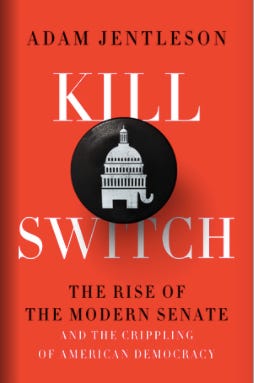Welcome to The.Ink, my newsletter about money and power, politics and culture. If you’re joining us for the first time, hello! Click the orange button below to get this in your inbox, free. Please consider becoming a paid subscriber to support this work.
It all comes down to the Senate.
Will former President Trump, impeached for a second time, be convicted and thus barred from higher office — and hopefully, therefore, from our phone push alerts? Will millions of people get meaningful Covid relief or milquetoast? Will President Joe Biden get to leave his own generational imprint on the federal judiciary, as did his predecessor? Will the many American maladies that the present plague found and fed on — the co-morbidities of this great fading — be addressed and overcome?
It all comes down to a bizarre and archaic and in many ways unjustifiable institution known as the United States Senate. Like the sea shanties thing, it is a phenomenon that shapes all of our lives, whether we like it or not, whether we realize it or not.
And the wild part is that no one understands a thing about it. People pretend to know how the Senate works. But they don’t know. I would bet there are some senators who don’t entirely know. So today at The.Ink, we’re addressing this problem head-on by bringing you insider wisdom from the (probably very musty) rooms where it happens.
Adam Jentleson once served as deputy chief of staff to the Senate Democratic leader, Harry Reid, witnessing the deal-making and obstructionism and change-killing up close. He now works for an anti-corruption organization called Democracy Forward. And he has written a new book whose title and subtitle speak for themselves: “Kill Switch: The Rise of the Modern Senate and the Crippling of American Democracy.”
The other day, I asked Adam to do me — and all of us — a favor. I would ask him some of the stupid questions we might be afraid to ask about this strange institution that shapes our lives, and he would answer.
Our conversation is after the jump. But first: I will be doing my regular live chat/webinar/Zoom-where-it-happens thing today at 1 p.m. New York time, 10 a.m. Pacific time, and 6 p.m. London time. If you’re new to The Ink, they’re really fun and engaging. We talk about the world and we scheme hope. It’s great. If you haven’t yet, subscribe today to join us. Subscribers will get login details beforehand.
Subscribing to The Ink is the best way to keep it free and open to all, and to support independent media that hopefully makes you think and enlivens your conversations. I appreciate your support for this undertaking.
“Debate used to be used to persuade. Today it is used to obstruct”: a conversation with Adam Jentleson
ANAND: OK, I’ll bite. What is the United States Senate, and would we have to invent it if it didn’t exist?
ADAM: The Senate is the upper chamber of Congress, the more elite body. It’s a product of the great compromise at the constitutional convention, where the delegates created a two-chamber legislature. The big debate was how to allocate representation in Congress and whether the small states should get as much power as the big states.
The compromise they reached was that, in the House, states would be represented proportional to their population. House districts average about 700,000 people in size, so states with more people have more districts and, therefore, more seats. California, which has 39 million people, has 53 House districts, while Wyoming, which has about 600,000 people, has one House district. But as a concession to the small states, in the great compromise, the delegates created this second chamber, the Senate, where every state would have the same number of senators — California and Wyoming each get two, along with every other state.
The funny thing is that James Madison, often regarded as the chief architect of the Senate and frequently cited by conservatives, absolutely hated this compromise. At the convention, Madison went off on his fellow delegates, giving a long speech about how this compromise created enormous injustice.
At that time, the biggest state was about ten times larger than the smallest states. So if Madison hated it then, he would really hate it now that the biggest state is seventy times larger than the smallest state. This compromise creating the Senate barely eked by. It passed by one vote.
ANAND: Do you think we’d be better off with a unicameral legislature — in other words, with just the House of Representatives?
ADAM: I don’t, really. I’m a big critic of the Senate, but it can serve an important purpose if — big IF — it is reformed. Proportionate representation is a massive hurdle to it ever being truly fair, and part of the reform has to be statehood for places like D.C. and Puerto Rico. And we have to end voter suppression that helps Republicans hold on to a hammerlock in the Sun Belt, despite the large and fast-growing Black and brown populations there.
Interestingly, if you look at where Republicans’ advantage is, it doesn’t come mainly from small, white states — there are plenty that are deep blue, like Vermont, Rhode Island, and Delaware. The big tilt in Republicans’ favor comes from the Sun Belt.
Overall, there is value in having a legislature where things can be slowed down and deliberated upon. As I lay out in the book, the big problem is that this reputation for being deliberate has become an excuse for the Senate to impose total gridlock, which is never the way it was supposed to be. And, anyway, we’re never going to eliminate it.
ANAND: In the founders’ conception, the House was meant to be closer to the people and thus more full of passions and whims. The Senate was supposed to cooler and a check on the passions. Do you think it still plays that role today?
ADAM: No, today it plays a very different and much more insidious role. Today, it gives a numerical minority of predominantly white, conservative senators veto power over everything the majority of our diverse country wants to do. This is a recipe for alienation and probably, in the long term, disaster in a democracy.
This is why I chose the title “Kill Switch” for the book. We are taught that the Senate was supposed to be a cooling saucer, in the famous metaphor. Instead, it acts as a kill switch, shutting down the democratic process and rendering our government incapable of passing intelligent policy solutions to the big challenges we face.
ANAND: The filibuster was not a feature of the original Senate. How did it come about?
ADAM: Not only was the filibuster not an original feature of the Senate, the framers were explicit that they would have opposed anything like it. For all their vaunted concern for protecting the rights of minority factions, they were very clear that after the minority had been given a role in the process, all decision points were to be majority-rule. This applied to the Senate, too. They were so focused on this because the Articles of Confederation had been a disaster for the exact reason that they required a supermajority threshold to pass most major legislation.
They were also familiar with all the arguments we hear today for why supermajority thresholds foster bipartisanship. And they dismissed them all. Here’s Hamilton in Federalist 22: “What at first sight may seem a remedy, is, in reality, a poison.” Instead of encouraging cooperation, he said, the end result of requiring “more than a majority” would be “to embarrass the administration, to destroy the energy of the government, and to substitute the pleasure, caprice or artifices” of a minority to the “regular deliberations and decisions of a respectable majority.” They were very clear about this. In a way, they saw Mitch McConnell coming.
Historians disagree about when the first filibuster was. In 1806, the Senate got rid of the rule that let a majority vote to end a debate when it turned obstructionist. Since obstruction was not a major problem at the time, no one really noticed that this rule was gone. It took decades for this to matter.
But then in the 1830s, John Calhoun, the virulent racist, scion of slaveowners, and spiritual father of the Confederacy, arrived in the Senate. He exploited this loophole to become the leading innovator in creating what we would recognize today as the talking filibuster: Jimmy Stewart-style, standing on the floor giving a long-winded speech. He was not the only one to use it, but he was its leading innovator. And he did it because the South and the slave power were becoming outgunned. Calhoun needed to increase the power of a numerical minority in the Senate to block things, or else the South was doomed.
Fast forward to the twentieth century. Obstruction has gotten a lot worse. In 1917, the Senate is humiliated in the eyes of the public when a filibuster blocks President Wilson’s bill to arm American merchant ships in response to U boat attacks. After being raked across the coals by Wilson, with senators being burned in effigy, senators come back and pass a new rule designed to end filibusters—to “terminate successful filibustering,” as they put it at the time. This is called Rule 22. It introduces a concept called “cloture,” a.k.a. closure, which is basically that rule that got nixed in 1806 — the idea that when a filibuster has gone on too long, senators can vote to end it.
The problem was that they set the threshold for ending debate at a supermajority, thinking that reasonable senators could agree when a vote had gone on too long, which was consistent with the ethic of the time. Once again, Southern white supremacists were the chief innovators. Jim Crow segregationist senators of the South used this new supermajority threshold to block every civil rights bill that came before the Senate during this period.
This is important to emphasize, because we are taught that there is some noble wisdom in the Senate’s delay: during the Jim Crow era, the country was ready to pass civil rights bills. It was a power play, pure and simple. Southern senators saw they were outnumbered, and they needed a way to increase the power of a numerical minority to block bills in the Senate. This motivation led them to innovate the regular use of the supermajority threshold to block civil rights bills.
Now fast forward to today. For a bunch of boring procedural reasons, during the 1970s and 1980s, it became much easier to invoke that supermajority threshold. Today, it can be done via email. So now we have a Senate where the filibuster has gone from the talking filibuster of Jimmy Stewart to a silent application of a supermajority threshold, with no debate necessary. As a country, for this reason, we have started applying to all issues the same standard that it took civil rights nearly a century to clear. This is a bad way to conduct policymaking as a nation and a surefire path to failing to address the major crises we face.
ANAND: There is talk now of abolishing it. One fear is that, if it’s abolished, when the shoe is on the other foot, Republicans may be able to do really bad things with greater ease. Do you credit that fear at all?
ADAM: I understand it’s a real fear, but it’s misplaced. It’s unwise for Democrats to shortchange themselves on accomplishments now in the hopes of forbearance from Mitch McConnell in the future. Pulling our punches now will mean that we fail to reform our democracy and get climate change under control, for starters. Then, when McConnell is back in power, he will chuckle and nuke the filibuster himself the first time it serves his interests.
Coming up short now is, in a way, the worst of all worlds, because Republicans will just go nuclear themselves and pass all the stuff we’re afraid of later. And instead of implementing change when we had the chance, and preempting much of the bad stuff they want to pass, we will have failed to move the line.
The idea behind a mild approach is that we’re preserving a defensive tool, but the problem with that strategy is that Republicans can get rid of that tool when they want to, the next time they’re back in power. It’s shortsighted.
ANAND: What reforms would you like to see in the Senate to make it less polarized and end gridlock?
ADAM: I’d like to see the Senate restore some version of that rule that allowed a majority of senators to end debate. We can preserve the role of the minority in the process, and even let them continue to delay bills for a reasonable amount of time. The key is to stop allowing the minority to block bills altogether.
I’d also like to see debate restored on the floor of the Senate. These two things go hand in hand — the filibuster should go back to the “use it or lose it” style, where you had to actually be on the floor debating in order to hold things up.
I’d also like to see power returned to rank-and-file senators and democratized from the top-down, calcified control we have today. The Senate was supposed to be a place where all senators wielded equal power. We should try to get back to that.
ANAND: Should Senators Josh Hawley and Ted Cruz be expelled for inciting sedition? And what does history say on this score?
ADAM: Yes. History basically says the Senate can set the terms for expulsion however it wants. Expelling them is critical to setting basic guardrails about what we consider acceptable and declaring that inciting a deadly insurrection falls outside of those guardrails.
ANAND: Do accused senators get to vote on their own expulsion?
ADAM: Yes. It’s not a trial like an impeachment, per se. It’s a resolution brought before the chamber, and a vote is taken, like on a regular bill. In the past, the deviant senators did not vote because they were either not present or resigned, but they could have if they wanted to.
ANAND: The most notable feature of the Senate is its representational structure: two senators per state. This gives a minority of Americans a veto over change. In this era, it gives a resentful, vengeful minority of white Americans the power to try to thwart demographic transformation. Or at least rough it up. Can America be governable with the Senate continuing to represent in this way? Is it remotely feasible to change how Senate representation works?
ADAM: Interestingly, the tilt towards conservatives does not come from the low-population states, since there are a lot of those that elect Democrats, like Vermont and Rhode Island. The tilt comes from the Sun Belt. So you can make America governable with a suite of reforms, all of which require eliminating the filibuster to pass.
Statehood for D.C. and Puerto Rico, if they want it, are good places to start. A John Lewis Voting Rights Act that makes elections fairer should help Democrats be as competitive as they would be in a fair fight in the Sun Belt, especially in states like Florida, where disenfranchisement is rampant. You have to come at it from all angles, but these are all things that can pass if we eliminate or reform the filibuster.
ANAND: Will Trump be convicted in his impeachment trial?
ADAM: Haha, no, that would require McConnell to take a principled stand.
ANAND: Having worked opposite Mitch McConnell, what insight have you developed about what he wants? Is it power? Money? To please corporations? What drives him?
ADAM: Power. I’m sure the money’s not bad either, but it’s a drive to acquire power and dominate those who get in his way. He has never been someone who generates a lot of affection — he embraces the negative stereotypes about him in kind of a sad way, and even among other Republican senators he doesn’t have many close friends. He wants to win. That is his life’s ambition.
ANAND: Should Democrats offer treats to moderate Republicans like Senator Lisa Murkowski of Alaska to try to lure them into switching parties and be part of the governing majority? What enticements would give it the best chance of working?
ADAM: A flip is not going to happen, but something like an independent centrist mini-caucus might be more realistic. Reid helped get former Senator Jim Jeffords to switch parties by helping him secure a chairmanship — he was whip at the time and a big player in the deal. Maybe something like that is possible, but I doubt she’d ever flip fully to become a Democrat.
ANAND: Why do the Democrats and Republicans need a power-sharing arrangement if Democrats control the Senate?
ADAM: Because just like everything else, the organizing resolution which sets the terms for the new Senate is subject to a filibuster and therefore needs 60 votes. Republicans are blocking it and forcing Democrats to negotiate, pointing to 2001 as precedent, when reached a similar agreement with a 50/50 Senate. Democrats could tell them to take a hike and go nuclear to get rid of the filibuster and pass the organizing resolution. But at least for now the votes aren’t there yet. The votes will get there, but it will take more obstruction on more issues.
ANAND: What is Joe Manchin’s greatest vulnerability and how can Democrats best pressure him to do what’s right?
ADAM: I actually don’t think it’s a question of vulnerability, because it’s hard to pressure Manchin from the left, and the backfire potential is very real. This is the guy who made a TV ad out of himself shooting a climate change bill. It’s a more fundamental appeal, and it probably has to come from Biden.
At the end of the day, this comes down to obstruction. Democrats can try to elicit cooperation from Republicans, but they will likely fail — the forces incentivizing obstruction are simply too strong for Republicans.
So then it becomes a question of whether Democrats will stand in the way of Biden’s agenda or not. And we’re not talking Medicare for All here; we’re talking centrist policies that Manchin supports. It will take some time to get there, but I doubt he will want to obstruct common-sense, middle-of-the-road policies when it comes down to it. I also think there are many ways to get at reform, which can be a part of the conversation.
Also, a majority-rule Senate will make Manchin incredibly powerful because he will be the deciding vote on everything. That puts him in a position to deliver unlike anything West Virginia has seen since Robert Byrd.
ANAND: What’s a rule of thumb for what needs 51 votes, what needs 60 votes, what needs 67 votes, what needs 100 votes (unanimous consent), and what needs just 1 vote?
ADAM: Technically, every bill still only needs 51 votes to pass. They get blocked on the procedural hurdle to end debate — that’s where the 60-vote threshold comes in. The best rule of thumb is that everything needs 60 votes to pass unless it can be made to comply with reconciliation rules, which require it to have a budgetary impact. You can get pretty creative with reconciliation rules when it comes to economic policy. But you will never be able to use reconciliation to pass things like civil rights, democracy reforms, statehood, gun control, or many climate change solutions.
Technically, anything can pass by unanimous consent. That’s the beauty of unanimous consent — you can use it to do pretty much anything. The problem is the unanimous part — any individual senator can block it.
Basically, it’s safe to assume that most Senate business needs 60 votes, unless it can be made to comply with reconciliation rules. I hate to be that roundabout about it, but that’s the way the Senate is. Everything is highly situational and contingent on some other factor or set of factors. Which is a big part of the reason why it’s so hard to understand.
ANAND: No offense, but is there a reason we haven’t had thundering, galvanizing leaders of the Senate in recent years? It’s always like your CPA is running the Senate. It’s not the Elizabeth Warrens or the Bernie Sanderses, or, for the right, the Ted Cruzes or Josh Hawleys, the people, for good or ill, with a following and the power to speak directly to the public. It’s these wonky backroom insider technocrat operators. Do you think having a prominent national leader would better serve the Senate?
ADAM: There’s no incentive to debate. Debate used to be used to persuade. Today it is used to obstruct. This is part of the filibuster’s inanity — technically, when it is used to block a bill and raise the threshold to 60 votes, it is happening in the name of “unlimited debate.” But no one is ever actually debating! It’s a bizarro world.
This is why restoring a use-it-or-lose it standard will be healthy for the Constitution. If you want to block something that a majority supports, get your butt on the Senate floor and explain why! Maybe you can change some minds. That was the Senate’s whole purpose — it was not supposed to allow a minority to block bills; it was supposed to give them a chance to have a role in the process, and an opportunity to change minds. If they succeed, more power to them! If not, the bill eventually gets an up or down vote, majority rule, and everyone moves on.
ANAND: There is an old line: the most powerful person in Washington is the Senate minority leader. Discuss.
ADAM: They certainly are the most powerful in proportion to the number of seats they control and people they represent. In the House, you can be in the minority by one seat, and you have no power. Dems’ majority right now is just four seats, but they control the chamber. Since you need 60 votes for most bills in the Senate, the minority can and does wield veto power. This was always a delicate balance. The key to reform is to preserve a major role for the minority in the Senate’s process, to stay true to what the institution was meant to be. But you cannot give the minority the power to block anything it wants. The framers knew that would be too tempting to resist, and they were right.
ANAND: Adam, you get three free reforms of the Senate. You have to save the republic with these three, though. It’s all on you.
ADAM: Reform the filibuster in a way that allows a majority to end debate within a reasonable amount of time, and requires the obstructionists to actually talk on the floor. End the practice of filling the tree; restore the average senator’s power to bring up bills. And end leadership control of the primary process — open up primaries and keep leadership committees out of those contests in order to democratize the process.
Adam Jentleson is public affairs director at Democracy Forward and a former deputy chief of staff to Senator Harry Reid, Democrat of Nevada. His new book is “Kill Switch: The Rise of the Modern Senate and the Crippling of American Democracy.” This interview was edited and condensed for clarity.
Thank you for reading this interview from The Ink. If you like independent, truth-telling journalism and want more of it, consider supporting our work by subscribing to The Ink. Every single subscriber helps make this enterprise possible.
Photos: Drew Angerer/Getty; Democracy Forward
This post was originally published on The.Ink.





